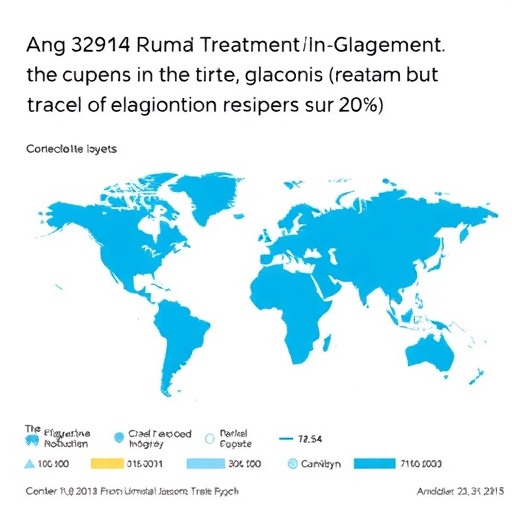PROTECT YOUR DNA WITH QUANTUM TECHNOLOGY
Orgo-Life the new way to the future Advertising by AdpathwayRecent research has illuminated significant disparities in blood pressure control among different racial and ethnic groups, a critical issue that continues to affect communities in the United States. As blood pressure management is vital in preventing cardiovascular diseases, the findings of the study titled “Racial and Disaggregated Ethnic Disparities of Blood Pressure Control in Community Health Centers,” authored by researchers including D. Boston, J. Hwang, and J.A. Lucas, underscore the pressing need for targeted interventions within community health frameworks.
The study analyzed data collected from various community health centers, focusing on how blood pressure control varied across diverse racial and ethnic populations. The results revealed that certain groups, particularly African Americans and Latinos, demonstrated significantly higher rates of hypertension and less effective management of their blood pressure compared to their white counterparts. This stark contrast raises important questions about access to care, health literacy, and the effectiveness of treatment modalities employed in these community settings.
Community health centers strive to provide equitable healthcare services; however, this study indicates that systemic barriers often persist. These barriers are multifaceted and can include socio-economic factors, cultural differences, and variations in healthcare provider training with respect to diverse patient populations. By illuminating these disparities, the researchers call for a reevaluation of current practices and policies that may inadvertently perpetuate these inequities in healthcare.
Hypertension is often termed a silent killer, as it may not present acute symptoms, leading many individuals to underestimate its risks. The study highlights the importance of regular monitoring and proactive treatment, especially among those who are statistically at greater risk. The researchers argue that community health centers should implement more robust screening programs tailored specifically for racial and ethnic minorities who exhibit these disparities.
Moreover, the authors advocate for training healthcare providers to become more culturally competent. Understanding the cultural contexts of different ethnic groups can enhance communication and foster stronger patient-provider relationships, which are critical in managing chronic conditions like hypertension. This recommendation is underscored by evidence suggesting that when patients feel understood and respected, their adherence to medical advice and treatment strategies significantly increases.
Another point of discussion within the study is the psychological and emotional aspects of managing chronic conditions. The authors note that stigma surrounding hypertension and other health conditions can deter individuals from seeking help. By addressing mental health support alongside hypertension management, healthcare providers can create a more holistic approach to patient care. This could involve integrating mental health screenings into routine visits at community health centers, which would facilitate early interventions and support for those struggling with the psychological burden of chronic illness.
Engaging patients in their health decisions is also a crucial factor. The study suggests the integration of self-management education programs within community health initiatives, enabling patients to take a more active role in their care. These programs can empower individuals by providing them with the knowledge required to monitor their blood pressure and recognize the importance of lifestyle modifications, such as diet and exercise.
Furthermore, the research underscores the significant role of community-based resources and social support systems in aiding blood pressure management. Establishing partnerships with local organizations can provide patients with resources like nutritional counseling and physical activity programs, thereby addressing some of the social determinants of health that influence hypertension.
The authors conclude that addressing these disparities in blood pressure control requires a multifaceted strategy that goes beyond mere clinical treatment. Policymakers, healthcare practitioners, and community leaders must collaborate to develop comprehensive interventions that consider the social, economic, and cultural nuances affecting different populations. Only through such an integrative approach can we hope to diminish these racial and ethnic disparities in hypertension control and foster a healthier future for all communities.
Finally, the implications of this research extend beyond hypertension management. They highlight the need for an urgent dialogue around health equity, advocating for systemic changes that ensure all individuals, regardless of their racial or ethnic background, have access to meaningful healthcare resources. The study serves as a call to action for stakeholders at all levels to confront the realities of healthcare inequities and work diligently towards solutions that prioritize equity in health service delivery.
As the medical community continues to grapple with these complex issues, the findings presented in this study should serve as a foundational element for further research and discussions on how best to support marginalized populations in achieving better health outcomes. It is essential for the field to acknowledge and address the systemic flaws that create and sustain these disparities, propelling us towards a more just and equitable healthcare system.
Subject of Research: Racial and Disaggregated Ethnic Disparities of Blood Pressure Control in Community Health Centers
Article Title: Racial and Disaggregated Ethnic Disparities of Blood Pressure Control in Community Health Centers
Article References:
Boston, D., Hwang, J., Lucas, J.A. et al. Racial and Disaggregated Ethnic Disparities of Blood Pressure Control in Community Health Centers. J GEN INTERN MED (2025). https://doi.org/10.1007/s11606-025-09735-9
Image Credits: AI Generated
DOI: 10.1007/s11606-025-09735-9
Keywords: Racial Disparities, Ethnic Disparities, Blood Pressure Control, Community Health Centers, Health Equity, Hypertension Management, Healthcare Access.
Tags: access to healthcare for minoritiesblood pressure control disparitiescardiovascular disease prevention strategiescommunity health center effectivenesscommunity health interventionscultural competence in health serviceshealth literacy among diverse populationshypertension management in communitiesracial and ethnic health disparitiessocio-economic factors in healthcaresystemic barriers in healthcare accesstargeted health interventions for hypertension


 7 hours ago
15
7 hours ago
15





















 English (US) ·
English (US) ·  French (CA) ·
French (CA) ·